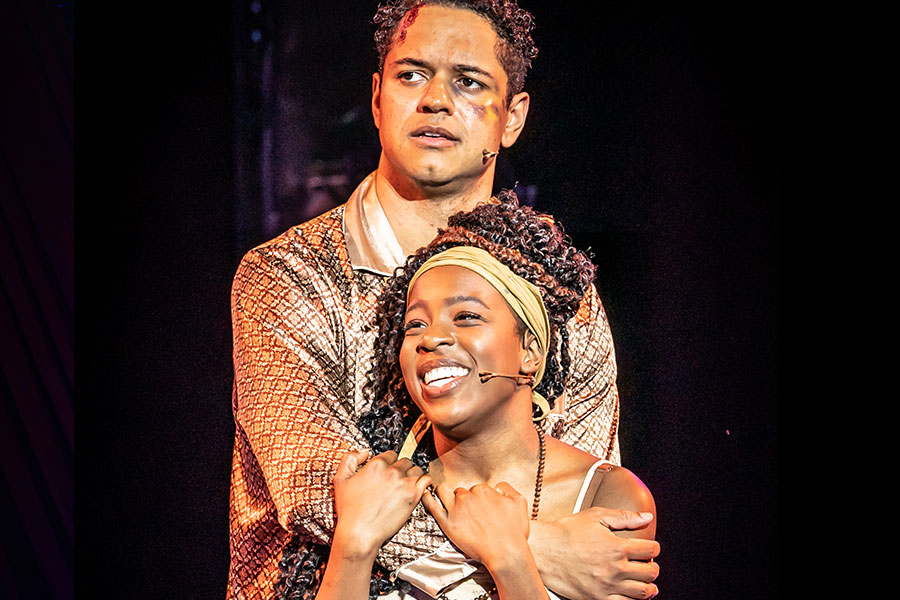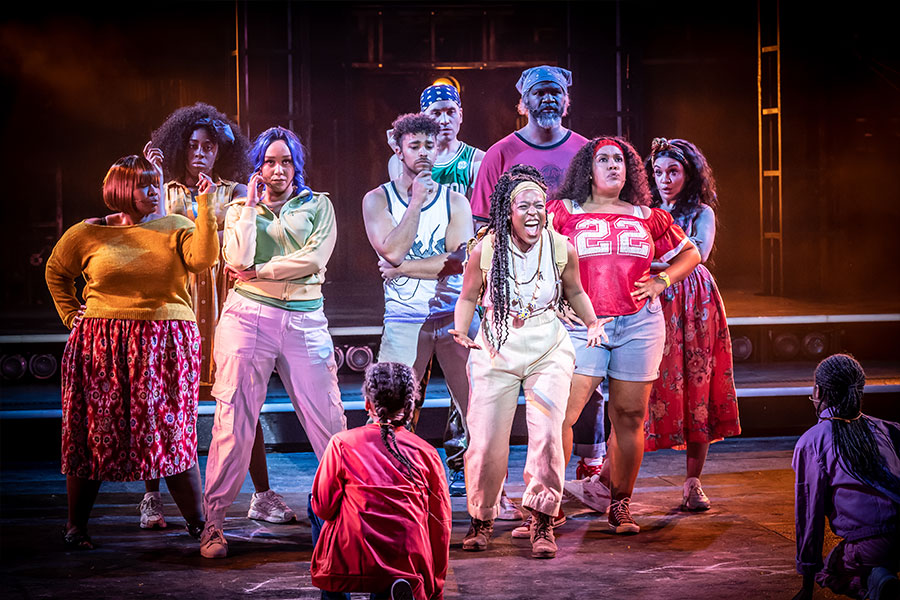Once On This Island review – myth-laden musical moves to modern-day Haiti
The hit musical is staged outdoors

I’m always slightly surprised that Once On This Island isn’t better known. Admittedly, the original Broadway production in the early 1990s only lasted a year although it garnered eight Tony nominations, and the non-replica London version (for which the entire Peacock Theatre was themed as a sort of tropical paradise) had an even shorter run, despite picking up the 1995 Olivier Award for Best Musical. It’s possible that the show’s reputation has been eclipsed by that of the same creative team’s kaleidoscopic epic Ragtime, which is commonly acknowledged as a modern masterpiece and received a Regents Park outing in 2012. But with Once On This Island, writing team Lynn Ahrens (book and lyrics) and Stephen Flaherty (music) created an unpolished gem of a musical, one that soars and sizzles as it reinvents a familiar folk tale and salutes the power of collective storytelling. It’s a beautifully crafted crowdpleaser that not enough crowds outside of musical theatre diehards seem to know about.
Set on an idyllic island in the French Antilles and based on Trinidadian-American writer Rosa Guy’s romantic novel My Love My Love, which was in turn a Caribbean riff on the legend of The Little Mermaid, the 90-minute show boasts an almost through-sung score of infinite riches with nary a dud in it. The characters and their lives are painted in broad but vibrant brushstrokes against an overwhelmingly tuneful gold-rush of soaring, lilting, Calypso-inflected numbers that lodge in the brain while making the heart swell. It’s powerfully melodic theatre music: there are soul-stirring, foot-stomping chorales that are equal parts celebration and terror, full-throated, joyful paeans to the sheer glory of living, power ballads that wouldn’t have sounded out of place on a Whitney Houston album back in the day, and even a witty operetta parody to explain the historically fractured relationship between the Black and mixed race inhabitants of the French Antilles.
The sentimental core story (orphaned peasant girl Ti-Moune falls for the rich mixed-race boy she nursed back to health after a near-fatal car accident only to be cast aside in favour of a daughter of wealth and privilege) is undoubtedly more challenging to the tear ducts than the brain, but Ola Ince’s Regents Park staging frames it with a harder edge than usual. Georgia Lowe’s stark, angular set features a sunken square surrounded by numerous revolving columns concealing lights and mirrors, and is a far cry from the lush tropical paradise previous designers aimed to evoke. The reason becomes clear from the outset: Ince has envisioned this “island” as present-day Haiti, in the grip of desperate poverty and a brutal militaristic regime. When the company of storytellers (reimagined here as modern dress street hawkers trying to make a buck out of the passing tourist trade) launch into “We Dance” (surely one of the most exhilarating opening numbers in any musical) it’s with an air of desperation (“we are dancing just to stay alive”) that renders the uplifting vocals and wonderful, loose-limbed dance moves (choreography by Boy Blue’s Kendrick ‘H2O’ Sandy) more poignant and potent than ever before.
In previous iterations, the tale of Ti-Moune is enacted by the storytellers to distract a distressed little girl from a raging storm overhead. Here, the story is told to comfort a pair of children (winningly played on opening night by Nielle Springer and Olivia St Louis, who alternate with two other teams of kids) after a nastily violent attack by the local militia, which has left one of the kids bloody faced and both of them traumatised. This lends the whole performance and the concept of escapism which runs through the story-within-a-story an extra layer of urgency.
It’s a bold approach that is mostly successful although it doesn’t always gel with the sweetness and whimsicality of the material, where a quartet of feuding Gods control and meddle in human destiny to settle scores amongst themselves, or where the ensemble transmogrify into cooing birds, whispering winds or bellowing frogs as Ti-Moune sets off across the island. To illuminate the convictions and superstitions of the island dwellers, Ince leans heavily into the Vodou (voodoo) traditions of Haiti with fascinating, sometimes sinister results. Overall, it’s such a spellbinding tapestry of sounds and images that the central love story almost feels extraneous, inevitably robbing the ending of a certain amount of its catharsis, despite the searing, open-hearted emotionalism of Gabrielle Brooks’s Ti-Moune.

As her adopted parents, Natasha Magigi and Chris Jarman tenderly, skilfully evoke a pair of kind souls, simple but not simple-minded, bewildered and beguiled by the whirlwind of a child they rescued from a tree: the number where they set her free to follow her destiny is heartbreaking, and will likely strike a chord in any parent with grown-up children. Even if the production could make more sense of the Gods (elaborately and imaginatively costumed by Melissa Simon-Hartman) controlling the course of the story, the actual performances are terrific (Emilie Louise Israel as Erzulie, Goddess of Love, Ashley Samuels: Agwe – God of Water, Lejaun Shepherd as a disturbing Papa Ge “sly demon of death”, and a barnstorming Anelisa Lamola as Mother of the Earth, Asaka, a role originated in this country by Sharon D Clarke). The choral singing throughout is absolutely thrilling. Brooks is a fine, feisty, unsentimental heroine, so self-assured and vital that when real pain hits her it’s almost unbearable to watch. Her singing is as fearless as her characterisation although it sometimes sounds strained at the top of her high belt, which is a part of her voice that this role requires her to use pretty relentlessly.
A couple of moments don’t really work (having Ti-Moune pop out of a giant cake and then get into a cat fight with her romantic rival feel ill-judged, and a final transformation goes for surprisingly little) but there’s ingenuity and authentic theatrical magic in the use of puppetry, dance, real fire, and in the way Jessica Hung Yan Hun’s lighting transforms the bleakly unforgiving space into the glittering opulence of the Grandhomme’s mansion. Perhaps inevitably, the production won’t match the 2018 Tony-winning version, which transformed Broadway’s Circle in the Square into a fully immersive tropical island complete with live goats and a sandy beach where what felt like an actual tempest and rains tore through the theatre during the storm sequence, but it remains a major thrill to experience this underrated score.
In truth, isn’t a production that particularly engages with its outdoor setting (except for one astonishing sequence near the end courtesy of sound designer Nick Lidster where all the contradictory voices in Ti-Moune’s tormented mind seem to be coming from every angle of the theatre) but it certainly engages with the heart, the tear ducts and the hairs on the back of your neck. It’s not a massive musical in terms of scale and ambition, and this may not be the staging that admirers of the work thought they were getting, but it still packs a shattering double-punch of joy and raw emotion. Definitely one to see.












